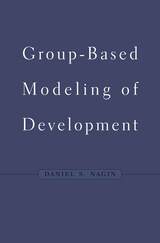
This book provides a systematic exposition of a group-based statistical method for analyzing longitudinal data in the social and behavioral sciences and in medicine. The methods can be applied to a wide range of data, such as that describing the progression of delinquency and criminality over the life course, changes in income over time, the course of a disease or physiological condition, or the evolution of the socioeconomic status of communities. Using real-world research data from longitudinal studies, the book explains and applies this method for identifying distinctive time-based progressions called developmental trajectories. Rather than assuming the existence of developmental trajectories of a specific form before statistical data analysis begins, the method allows the trajectories to emerge from the data itself. Thus, in an analysis of data on Montreal school children, it teases apart four distinct trajectories of physical aggression over the ages 6 to 15, examines predictors of these trajectories, and identifies events that may alter the trajectories.
Aimed at consumers of statistical methodology, including social scientists, criminologists, psychologists, and medical researchers, the book presents the statistical theory underlying the method with a mixture of intuition and technical development.

In Telling Stories, more than a dozen longitudinal writing researchers look beyond conventional project findings to story their work and, in doing so, offer otherwise unavailable glimpses into the logics and logistics of long-range studies of writing. The result is a volume that centers interrelations among people, places, and politics across two decades of praxis and an array of educational sites: two-year colleges, a senior military college, an adult literacy center, a small liberal arts college, and both public and private four-year universities.
Contributors share direct knowledge of longitudinal writing research, citing project data (e.g., interview transcripts, research notes, and journals), descriptions drawn from memory, and extended personal reflections. The resulting stories, tempered by the research and scholarship of others, convey a sense of longitudinal research as a lived activity as well as a prominent and consequential approach to inquiry. Yet Telling Stories is not a how-to guide, nor is it written for longitudinal researchers alone. Instead, this volume addresses issues about writing research that are germane to all who conduct or count on it. Such topics include building and sustaining good interpersonal research relations, ethically negotiating the institutional power dynamics that undergird writing research, effectively using knowledge from longitudinal studies to advocate for writers and writing educators, and improving both conceptual and concrete resources for long-range research in writing studies.
READERS
Browse our collection.
PUBLISHERS
See BiblioVault's publisher services.
STUDENT SERVICES
Files for college accessibility offices.
UChicago Accessibility Resources
home | accessibility | search | about | contact us
BiblioVault ® 2001 - 2024
The University of Chicago Press









